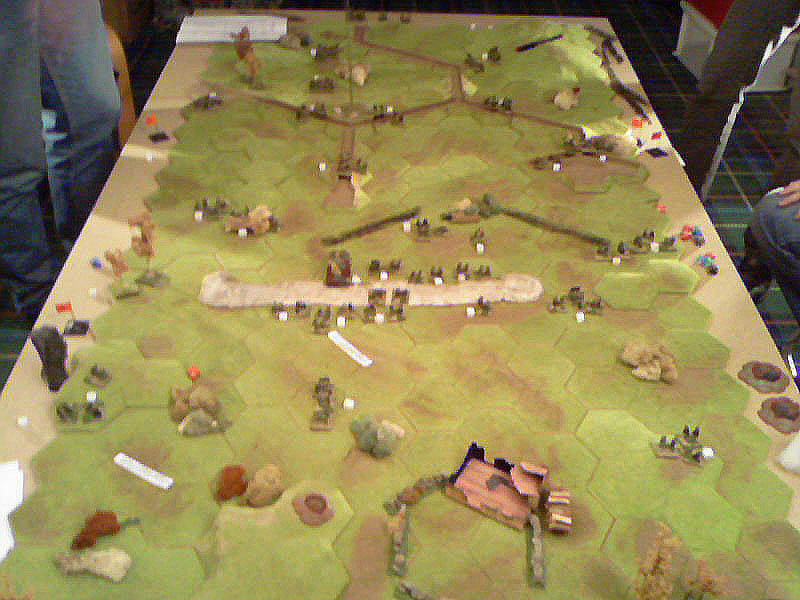
Tuesday March 14 saw the 3rd game in the now highly succesful (ahem, shameless self-promotion) series of “Games in Phil’s Attic”.
The theme this time was the Western front during WW1. The Germans had to attack a British trench system. Due to the fact that I have far less British than German figures, the Germans always end up being the attacker.
The map was laid out such that would be a ‘defence in depth’ scenario. The main attack direction was along the length of the table to allow for this. To simulate this defence in depth idea, the British deployment was such that a minimum number of units had to be in the frontal zone, but the bulk was in the rear zone, where the main trenches were located. Unknown to the Germans, the British also had the availability of barbed wire sections and minefields which they could deploy anywhere.
The Germans had to divide their force in 3 Stosstruppen, and each Stosstrupp was assigned a particular attacking axis. Units could not leave their sector, thereby simulating the idea of 3 formations attacking in parallell, but each in their own sector of the battlefield. We called this the ‘German Doctrine’.
The game was spiced up by random events, ranging from infantry reinforcements, morale boosts, airplanes, an A7V tank, off-board artillery, etc.
Frank en Koen took the German side, Eddy and Bart played the British. Initially, the German advance went well. The frontal sentry units of the Tommies were wiped out fast. When reaching the 2nd line (this was the first trench), the advance halted for a moment, but in the end, the British vacated this position as well (British mortars seem to have problems hitting anything) to fall back to their third line. This third line (and full trnech system) was reinforced by troops coming from the back (and due to lucky random events).
The losses on the German side started to pile up, but the impetus of the attack was still strong. In the mean time, an A7V tank had entered the battlefield, and despite rumours of tanks not working, it kept pushing forward, refusing to malfunction. Also, an Albatros bomber had also appeared to help the infantry assaults underneath.
The German infantry managed to infiltrate the final trenches, but resistance was very stiff. However, by that time, it was after midnight, and we decided to stop the game. Some discussion followed about who would have won, but fairest thing to say is that it still could have gone either way. By looking at the random events still left, the British would still receive quite a few new reinforcements, but the Germans still had their field guns intact, with which they could keep hammering the British Infantry from a distance.
So, in the end, it went just as in WW1: lots of casualties on both sides, , and no-one really was sure who had won in the end. But gamewise, it was a lot of fun!
Here’s a not so sharp picture. I just bought a new GSM, and apparantly, I don’t know how to work the camera properly yet …

Note to self: must buy a set of green D6’s. Belnds in better with the scenery.
Visual Appeal is Everything!
What set of rules were used? I’m guessing you might have written them specifically for your hex terrain…
Ian,
Yes, I wrote the rules myself, but with ideas heavily borrowed from ‘Lead from the Front’, a ruleset that’s available on www.freewargamesrules.co.uk .
This is the approach I use in most of my games. Since I try to make multi-player games, to be finished in an evening and with emphasis on the scenario and storyline, I prefer to write my own rules. The advantage is that they are usually kept simple, so anyone can join.
The disadvantage is that the finer points of troop types etc. present in more elaborate rules are not part of my games.
Isn’t the world a small place! “Lead From The Front” are my own rules which I wrote last year. I use them for my own games but I also have a hex mat (from the old Battlemasters board/miniatures game) and was wondering if they would work well using hexes. Anyway, I am glad you liked the rules and I hope you found some nice ideas in them. I always encourage such borrowing of ideas; this way everyone gets to play the game they want to, but you don’t always have to reinvent the wheel. I am sure many of own rules have many borrowed ideas in them. Sometimes it is hard to keep track of where all the ideas have come from!
If you ever write up your modifications, I would enjoy reading over them. One day I will make a proper website for Lead From… and my other games. Sady the old site I used to host the rules is no more. But the rules are still available (people can email me for a copy). I’m even hoping to write a new version soon. I was trying to work out how you could include aircraft in the game. Obviously you have beaten me to it!
One thing I wasn’t really happy with was the rules for mortars. I feel sorry for your poor British troops, if that is all they had to try and stop the German tank…
Ian,
I send you a copy of the rules. Yes, the world is a small place ;-). Sorry I didn;t recognize you imemdiatly.
It’s indeed as you say, many ideas in wargaming are shared and borrowed, and do agree with you full about that this is a good thing!
BTW, for other hex-based rules, check out the Te Wapen yahoogroup.